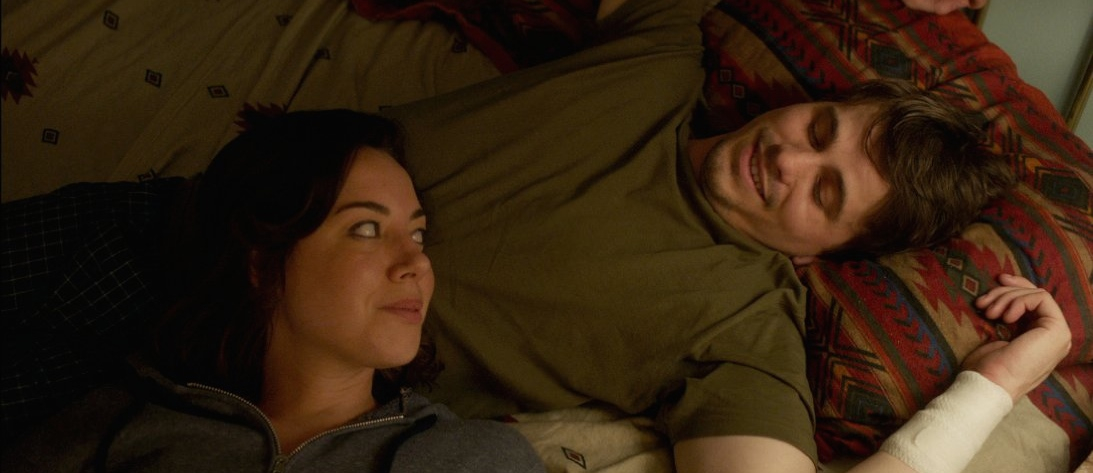It sounds familiar: a group of upwardly mobile, mostly white friends reconvene a few years after college and wind up bringing old loves and regrets to light. There are quite a few movies like this, but they all huddle together in the shadow of the 1983’s The Big Chill. More than thirty graduating classes have come and gone since then, but any story about a group of friends reassessing the bonds that once brought them together is bound to draw comparisons to Lawrence Kasdan’s movie. About Alex, from first-time feature writer and director Jesse Zwick, is no exception. Zwick’s response: turn into the skid, and have your characters talk about “those ’80s movies” about thirtysomething reunions. Zwick’s film isn’t just similar to The Big Chill in premise — the older film’s plot was kickstarted by the suicide of a character named Alex; here, Alex merely attempts suicide — but an active remake for the older members of Generation Y. He knows that critical comparisons are unavoidable, but more interestingly, he also knows realistic, culturally savvy characters would know all about The Big Chill and recognize that they were reenacting a version of it.
About Alex, then, reveals itself not just as the latest iteration of a story about generational angst, but a remarkably accurate one for this specific generation. It’s self-aware, but not smug, and it’s frank about technology and music and culture in ways that feel refreshingly plain. After Alex (Jason Ritter) attempts to kill himself, his friends convene for a weekend at his secluded house in upstate New York to offer support and try to deal with what happened. Sarah (Aubrey Plaza) is hung up on the presence of Isaac (Ben Minghella), the object of her unrequited college love, and the fact that Isaac has brought his new girlfriend, Kate (Jane Levy), for the weekend. Josh (Max Greenfield) is bitter and uneasy about the entire situation, and he resorts to needling his friends to fend off his fears. Ben (Nate Parker) and Siri (Maggie Grace) are at a crossroads in their own relationship: she gets a job offer in California, while he struggles with the fact that his unfulfilling day job at a magazine isn’t helping him become the great novelist he thought he’d be by now. Everyone has just slightly veered off the track they’d laid down at commencement, and Alex’s act has jarred them into wondering what will happen to any of them, and whether they’ll get where they need to be.
That all sounds fairly rote on paper, and there are, admittedly, moments in Zwick’s film that feel like he’s just checking off the boxes. (He’s also prone to lapses into forgettable banter, as when two characters bicker over the timing of a piece of personal news: “When were you gonna tell me?” “What do you mean? I’m telling you now.” Scenes like this feel like they come preinstalled with screenwriting software.) But when the group assembles at Alex’s house, things start to tighten up, thanks largely to the cast’s ease in their roles and with each other.
As befits a movie that recreates The Big Chill while also admitting it’s doing as much, About Alex is obsessed with the obsession for nostalgia that seems to strike every generation once they’re a few years removed from the time they hazily refer to as the best years of their lives. Josh is working on a thesis about “the future of biography,” and how the evolution of social media will affect the way people chart the narrative of their lives. The film deals with the ubiquity and etiquette of social media better than any other film to date, neither putting Facebook in scare quotes nor hiding them or writing them off. These networks are just used in the omnipresent, sometimes jokey way that they already are in the lives of many people, especially people of the age and inclination as the characters here. Josh embodies the uncomfortable duality of his peers: He rails against his generation’s reliance on social media as an indulgence — “The only thing I hate more than the present is nostalgia for the past,” he says — but he does so even as he leans for unnameable comfort on the friends he first made years earlier.
The film is strongest when it leans away from the easy plotting Zwick wants to keep imposing on it. (One character dreams of opening a restaurant; another’s an investment banker dying to offer the seed money.) There’s a neatness to some of the film that only winds up highlighting the artifice. Thankfully, Plaza and Greenfield lead the cast through the warm, gentle waters, and the group’s energy — by turns playful, fearful, impatient, and resilient — makes an ordinary story feel a little more rounded and lived-in. Every generations wants to do right where they saw their parents do wrong, and the film indulges in some of that flattery: this Alex gets to live, after all. But the film’s surety comes from the way its characters ask questions, not the way Zwick wants them to find answers. About Alex is familiar inside and out, but that doesn’t make it any less true. Just the opposite.





















One thought on ““About Alex” and the Way We Live Now”
Pingback: My Cinematic Year in Review, 2014 | Daniel Carlson